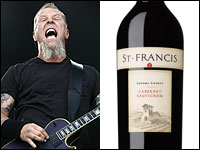 Talking with friends the other day about the amazing ways in which states of mind affect our perceptions. We spend a lifetime believing that our senses don’t lie, while our senses are themselves undergoing constant, tortuous manipulation by expectations and previous experience. If a hunter sees a leaf blowing across the road, he might raise his rifle, thinking it’s a rabbit, while his non-hunting companion sees only a leaf blowing across a road. What we experience is “real” to us, even though that experience could be dramatically altered by an empty stomach, a bad hair day, or a month on Xanax. Sounds cliche’, but what is “real,” anyway?
Talking with friends the other day about the amazing ways in which states of mind affect our perceptions. We spend a lifetime believing that our senses don’t lie, while our senses are themselves undergoing constant, tortuous manipulation by expectations and previous experience. If a hunter sees a leaf blowing across the road, he might raise his rifle, thinking it’s a rabbit, while his non-hunting companion sees only a leaf blowing across a road. What we experience is “real” to us, even though that experience could be dramatically altered by an empty stomach, a bad hair day, or a month on Xanax. Sounds cliche’, but what is “real,” anyway?
Caught a great segment on NPR the other day (via podcast) about a vintner doing studies on the impact various kinds of music has on tasters’ perceptions of wines.
Cabernet Sauvignon, for example, is best when paired with “music of darkness” — thanks to the ability of rage-filled songs to smooth out similarly aggressive tannins, Smith’s theory holds. An idyllic Mozart composition, on the other hand, works in reverse, potentially ruining a good Cab.
His results are apparently readily reproducible. Does this mean that wine tastings should be conducted in absolute silence for objectivity’s sake, or that the right music should be played for each wine tasted? And why do people talk about what foods wines go with, but never what music? After listening to this, music seems like a pretty important factor in the chemistry of perception.
Then happened on an equally fascinating write-up on some tweaked wine tastings. In one:
Brochet invited 57 wine experts and asked them to give their impressions of what looked like two glasses of red and white wine. The wines were actually the same white wine, one of which had been tinted red with food coloring. But that didn’t stop the experts from describing the “red” wine in language typically used to describe red wines. One expert praised its “jamminess,” while another enjoyed its “crushed red fruit.” Not a single one noticed it was actually a white wine.
On the surface, the results would seem to throw all pretense of objectivity in wine tasting out the window. “The second test Brochet conducted was even more damning:”
He took a middling Bordeaux and served it in two different bottles. One bottle was a fancy grand-cru. The other bottle was an ordinary vin du table. Despite the fact that they were actually being served the exact same wine, the experts gave the differently labeled bottles nearly opposite ratings. The grand cru was “agreeable, woody, complex, balanced and rounded,” while the vin du table was “weak, short, light, flat and faulty”. Forty experts said the wine with the fancy label was worth drinking, while only 12 said the cheap wine was.
So in these cases, perception was being altered not by audio inputs, but by messing with expectations. Lots of interesting comments on that story, illuminating the problem in a myriad of ways. To me, the take-away is not that one must discard all pretense to objectivity, or the idea of a “science” of wine, but that vinophiles can use the practice to explore the melding of senses and conditions, play with them, mash them up. As long as one is aware that the tongue and nose don’t tell the whole story, and that the rest of one’s mind, body, and prior experience factor in, then the sense of play is retained. But take yourself too seriously, lay claim to objectivity on a slippery slope, and the house of cards falls down.
See also: Similar piece on coffee and the retail experience.

This is a interesting article, and one that holds a lot of validity.
It is so true that human perception is so deceiving.
One way that a “more true” wine tasting can go is with the blind tasting, so there are no ways to have perception come into play, except the palate…
I guess it needs to now be blind and silent tastings!
But the error rate in wine tasting can be pretty big.
I’d be interested to see if someone like a master sommelier can get duped as well.
But just about anything can ruin some thing good, so I can see how music can affect wine taste.
So serve the cab with some pearl jam and a nice rack of lamb.
Quoting from Thomas Harris’ book:
“A census taker tried to quantify me once. I ate his liver with some fava beans and a big Amarone. Go back to school, little Starling.”
Wish the film had stuck to the book. A culture vulture like Lecter wouldn’t be seen dead guzzling a common country wine plonk like Chianti. Amarone della Valpolicella is so much more like him.